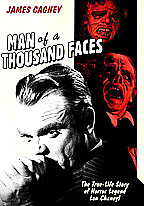 MAN
OF A THOUSAND FACES (1957)
MAN
OF A THOUSAND FACES (1957)Director: Joseph Pevney
Universal
 MAN
OF A THOUSAND FACES (1957)
MAN
OF A THOUSAND FACES (1957)In creating such memorable and iconic characters as Erik, the Phantom of the Opera and Quasimodo in THE HUNCHBACK OF NOTRE DAME, Lon Chaney would inspire make-up artists and visual effects pioneers for years to come. His technical influences can be seen in the work of Rick Baker and the late Stan Winston, and his poignant performances help establish the notion that even in tinseltown you don’t have to play the good looking leading man to connect with an audience.
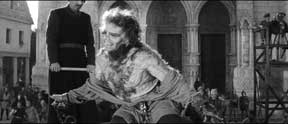
Born the son of deaf mute parents, Lon (James Cagney) was constantly teased and bullied as a child. Such tormentors did not however sway Lon from sticking up for his parents who encouraged Lon’s inherit gift for pantomime and imitation. Years later such skills would land Lon work in several traveling vaudeville acts, where his comedic clown routines always garnered a hearty laugh. It is while touring that Lon would meet Cleva (Dorothy Malone) a beautiful young singer and his future bride. While on tour together, Cleva’s announcement of pregnancy throws Lon into a tizzy that guides him to insist that Cleva wind down her career as a songstress to become a stay-at-home mother. Terrified that their child may be born deaf and hesitant to give up her independence, Cleva reluctantly gives birth to a son, Creighton. The healthy boy instantly becomes the apple of his father’s eye, but Cleva steadily becomes more neglectful to the lad, eventually abandoning him for a career of her own. Confronting Cleva about her deserting their boy, Lon files for divorce only to have his heart broken when the courts find his current situation unsuitable and orders that Creighton be placed in foster care. Desperate to get his boy back, Lon heads to Hollywood where he takes any and every extra job available to him. Lon’s knack for make-up is brought to the studios' attention and with the help of his agent Clarence (Jim Backus, Thurston Howell III on "Gilligan's Island"), Lon’s talents swiftly become in high demand. Ultimately regaining custody of Creighton after marrying a stage acquaintance from the past, Hazel Bennett (Jane Greer), Lon would go on to create some of silent films' most unforgettable characters.
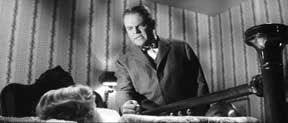 Biographical
pictures, or biopics, have become a popular story device in Hollywood, particularly
within the last five years. A hot property for studios and actors looking for
award recognition, it has become commonplace to see either the Best Actor or
Best Actress categories awarded to someone playing a recognizable, though tragic
public figure. While Lon Chaney certainly led a fascinating life that left an
unmistakable mark on cinematic history, MAN OF A THOUSAND FACES feels timid
and often comical in comparison to the recent inundation of biopics, so often
over-rot with drug
addiction and sexual indiscretions. The film plays loose with the facts
with very little known about the man at the time of shooting, as Lon preferred
to express himself through his diverse characters, purposely billing himself
as a man of mystery. While MAN OF A THOUSAND FACES does deal with many of the
elements that most modern biopics find necessary to draw an audience (infidelity,
betrayal, financial struggles) in comparison, the end result seems timid if
not quaint. One of the film's more memorable conflicts, that of Cleva’s
prejudice against Lon’s parents is almost laughable, as in today’s
politically correct world it is hard to fathom anybody being so outwardly repulsed
by another speaking in sign language.
Biographical
pictures, or biopics, have become a popular story device in Hollywood, particularly
within the last five years. A hot property for studios and actors looking for
award recognition, it has become commonplace to see either the Best Actor or
Best Actress categories awarded to someone playing a recognizable, though tragic
public figure. While Lon Chaney certainly led a fascinating life that left an
unmistakable mark on cinematic history, MAN OF A THOUSAND FACES feels timid
and often comical in comparison to the recent inundation of biopics, so often
over-rot with drug
addiction and sexual indiscretions. The film plays loose with the facts
with very little known about the man at the time of shooting, as Lon preferred
to express himself through his diverse characters, purposely billing himself
as a man of mystery. While MAN OF A THOUSAND FACES does deal with many of the
elements that most modern biopics find necessary to draw an audience (infidelity,
betrayal, financial struggles) in comparison, the end result seems timid if
not quaint. One of the film's more memorable conflicts, that of Cleva’s
prejudice against Lon’s parents is almost laughable, as in today’s
politically correct world it is hard to fathom anybody being so outwardly repulsed
by another speaking in sign language.
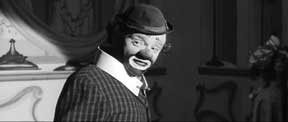
As a whole, the picture holds up well as a time capsule of the era it was made and as a showcase for a number of solid performances. Surrounded by a strong supporting cast, including a young Robert Evans as prouder Irving Thalberg, MAN OF A THOUSAND FACES may be one of Cagney’s strongest roles, as his performance switches from comedic to dramatic without once losing its step. While the story is compelling, if not a little long, fans of Chaney are left wanting more as too strong an emphasis is placed on his marital issues, as apposed to the development of his craft. THE HUNCHBACK OF NOTRE DAME and THE PHANTOM OF THE OPERA are only briefly touched upon and the developments of over a hundred different unique characters are only momentarily seen, often as sketches through a montage. It is also hard to fully invest in several of the picture’s plot points, as much more is now known about Mr. Chaney that boldly contradict the film's accounts. I’m not one for remakes, but there is a considerable amount of drama left to be told regarding the Chaney clan.
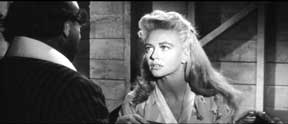 With
Image Entertainment’s 1998 release of MAN OF A THOUSAND FACES long out
of print, Universal has stepped up with a digitally remastered DVD whose picture
quality borders on flawless. The anamorphic widescreen presentation maintains
the film’s original 2.35:1 aspect ratio, serving the CinemaScope cinematography
amazingly well. With not a single grain of dust to distract from the proceedings,
the picture quality is detailed and black levels are rich. Audio is available
in a clear English Dolby Digital 2.0 Mono, with optional English and French
subtitles available. Surprisingly, this release offers no extra features, a
curious notion as one would think Universal would have any number of Chaney
features readily available. Forget having to dig deep for supplementary materials,
if they cracked open the vault, the odds are fairly good that a reel featuring
Chaney would roll out the door. (Jason
McElreath)
With
Image Entertainment’s 1998 release of MAN OF A THOUSAND FACES long out
of print, Universal has stepped up with a digitally remastered DVD whose picture
quality borders on flawless. The anamorphic widescreen presentation maintains
the film’s original 2.35:1 aspect ratio, serving the CinemaScope cinematography
amazingly well. With not a single grain of dust to distract from the proceedings,
the picture quality is detailed and black levels are rich. Audio is available
in a clear English Dolby Digital 2.0 Mono, with optional English and French
subtitles available. Surprisingly, this release offers no extra features, a
curious notion as one would think Universal would have any number of Chaney
features readily available. Forget having to dig deep for supplementary materials,
if they cracked open the vault, the odds are fairly good that a reel featuring
Chaney would roll out the door. (Jason
McElreath)